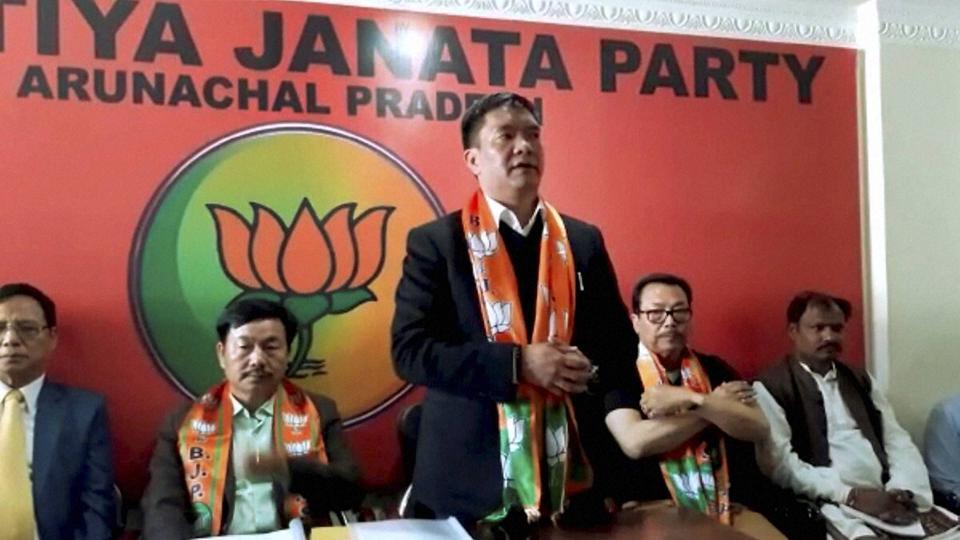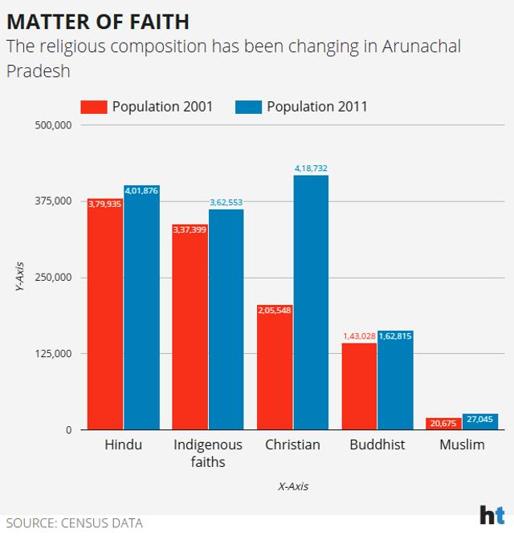
The Congress in Arunachal Pradesh has accused the ruling Bharatiya Janata Party (BJP) of pushing Hinduism, once again shinning the spotlight on conversions in the state that borders China.
The BJP came to power in Arunachal Pradesh – the second time in 12 years – in December after 33 of the 43 MLAs of the regional People’s Party of Arunachal switched over.
State Congress general secretary Minkir Lollen said on Friday Prime Minister Narendra Modi’s hidden agenda was to make Arunachal Pradesh a Hindu-majority state through ghar wapsi.
Ghar wapsi, the Hindi word for homecoming, is the name of a proselytizing campaign launched by some Hindu outfits to convert non-Hindus and “bringing them back into the fold of Hinduism”.
“The indigenous tribes will be insisted upon to adopt Hindutva. The rich tradition and culture of the indigenous tribes of Arunachal Pradesh are at stake under BJP rule,” he said.
The BJP hit back the next day, saying the Congress played a big role in changing the demography of the northeastern state.
“The Arunachal Pradesh Congress Committee has had a long history in being a catalyst for reducing the indigenous population, while BJP has always stood for policies that support preservation of indigenous practices, tradition and culture,” state BJP chief Tapir Gao said.
War of faiths
The exchange has brought to fore the challenges faced by indigenous faiths such as Donyi-Polo and Rangfra primarily from Christian missionaries.
The followers of Donyi-Polo (Sun-Moon) belong to the Abotani group comprising tribes such as Apatani, Galo, Nyishi and Tagin.
Adherents of the Rangfra faith, a tribal variant of the Vaishnavism, are mainly the Tangsa tribal people.
The Vanavasi Kalyan Ashram, an affiliate of the Rashtriya Swayamsevak Sangh, the ideological parent of the BJP, has allegedly been promoting the indigenous faiths of Arunachal Pradesh.
 But, many have converted to Christianity over the past three decades, allegedly because of costly and elaborate rituals. Census data say Arunachal Pradesh had no Christians in 1951. By 2001, Christians were the third largest religious group accounting for 18.7% of the state’s population, behind Hindus (34.6%) and ‘others’, mostly Donyi-Polo (30.7%).
But, many have converted to Christianity over the past three decades, allegedly because of costly and elaborate rituals. Census data say Arunachal Pradesh had no Christians in 1951. By 2001, Christians were the third largest religious group accounting for 18.7% of the state’s population, behind Hindus (34.6%) and ‘others’, mostly Donyi-Polo (30.7%).
According to the 2011 census, Christianity is now the state’s largest religion. Christians – bulk of them Roman Catholics – account for 30.26% of the state’s 1.3 million people. Hindus were pushed to the second spot at 29.04%.
Though Arunachal Pradesh had 5.56% fewer Hindus in 2011 than in 2001, traditionalists were more worried by the 4.5% drop in the number of followers of Donyi-Polo and other indigenous faiths.
Arunachal was the third Indian state after Odisha (1967) and Madhya Pradesh (1968) to enact an anti-conversion law. The Arunachal Pradesh freedom of religion act of 1978 was aimed primarily at checking proselytization.
Chhattisgarh in 2000, Gujarat in 2003, Himachal Pradesh in 2007 and Rajasthan in 2008 also passed anti-conversion laws, prohibiting forced or money-induced conversions.
The Arunachal anti-conversion law, unlike in the other states, has been ineffective because its rules have not been framed.
There is speculation that the BJP government led by Pema Khandu might frame the rules to check missionary activities.
Checking conversion has been one of BJP’s goals. In 2013, BJP leader Venkaiah Naidu had declared that his party would bring a nationwide anti-conversion law if elected to power.
The party needs a majority in the Rajya Sabha to do so.
Source: Hindustan Times



